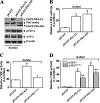Hyperosmotic stress-induced ATF-2 activation through Polo-like kinase 3 in human corneal epithelial cells
- PMID: 21098032
- PMCID: PMC3023491
- DOI: 10.1074/jbc.M110.166009
Hyperosmotic stress-induced ATF-2 activation through Polo-like kinase 3 in human corneal epithelial cells
Abstract
Elevated extracellular solute concentration (hyperosmotic stress) perturbs cell function and stimulates cell responses by evoking MAPK cascades and activating AP-1 transcription complex resulting in alterations of gene expression, cell cycle arrest, and apoptosis. The results presented here demonstrate that hyperosmotic stress elicited increases in ATF-2 phosphorylation through a novel Polo-like kinase 3 (Plk3) pathway in human corneal epithelial (HCE) cells. We found in hyperosmotic stress-induced HCE cells that Plk3 transferred to the nuclear compartment and was colocalized with ATF-2 in nuclei. Kinase activity of Plk3 was significantly activated by hyperosmotic stimulation. Further downstream, active Plk3 phosphorylated ATF-2 at the Thr-71 site in vivo and in vitro. Overexpression of Plk3 and its mutants enhanced hyperosmotic stress-induced ATF-2 phosphorylation. In contrast, suppression of Plk3 by knocking down Plk3 mRNA effectively diminished the effect of hyperosmotic stress-induced ATF-2 phosphorylation. The effect of hyperosmotic stress-induced activation of Plk3 on ATF-2 transcription factor function was also examined in CRE reporter-overexpressed HCE cells. Our results for the first time reveal that hyperosmotic stress can activate the Plk3 signaling pathway that subsequently regulates the AP-1 complex by directly phosphorylating ATF-2 independent from the effects of JNK and p38 activation.
Figures







References
-
- Lang F., Busch G. L., Ritter M., Völkl H., Waldegger S., Gulbins E., Häussinger D. (1998) Physiol. Rev. 78, 247–306 - PubMed
-
- Deutsch C., Slater L., Goldstein P. (1982) Biochim. Biophys. Acta 721, 262–267 - PubMed
-
- Burg M. B., Ferraris J. D., Dmitrieva N. I. (2007) Physiol. Rev. 87, 1441–1474 - PubMed
Publication types
MeSH terms
Substances
Grants and funding
LinkOut - more resources
Full Text Sources
Molecular Biology Databases
Research Materials

